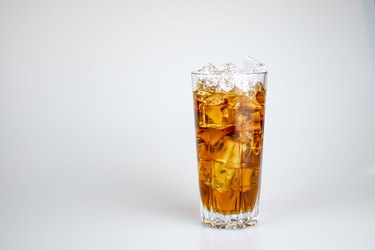
Funny thing about those tall glasses of cola people love to guzzle. For some, soda stops migraines or can ease them faster when they do strike. For others, those same soft drinks could be the cause of their migraines. How can they do both? It likely has to do with the caffeine content.
Using Caffeine for Migraine Relief
Video of the Day
The U.S. Food and Drug Administration has limited the amount of caffeine allowed in a 12-ounce serving of cola and other caffeinated soft drinks. According to the Center for Science in the Public Interest, which lists the caffeine content in many brand-name sodas, that's 71 milligrams. (By contrast, an 8-ounce cup of coffee has about 100 milligrams of caffeine.) Researchers don't know exactly how, but caffeine has some ability to combat migraine pain.
Video of the Day
One theory has to do with the effect caffeine has on a chemical found naturally in the brain called adenosine, according to the American Migraine Foundation. Levels of adenosine are higher than normal during migraines. Caffeine helps bring down those levels, easing your pain.
Indeed, caffeine's pain-stopping properties are why it's found in some medications, including those specifically made to treat headaches. For example, Excedrin (Extra-Strength and Migraine varieties), which many people take for headache relief, contains aspirin, acetaminophen and caffeine. A study published October 2017 in the Journal of Headache and Pain found that headache medicines that contain caffeine are more effective for many people than painkillers without it.
Caffeine may also help your body absorb other drugs faster, meaning you will get relief sooner. That's another reason it's in so many headache meds, according to the Cleveland Clinic.
Can Soda Give You Headaches?
While you may find that consuming caffeine – whether in coffee or soda – helps prevent or ease migraines, you may not want to rely on it every day. Your body could become so used to the caffeine you're drinking that it stops being effective, says the American Migraine Foundation. You might get around this by drinking caffeinated beverages only one or two days a week.
But there's another reason you don't want to go overboard with caffeinated soda or coffee: "While small amounts of caffeine can be beneficial for headaches, too much caffeine can lead to headaches," says Danielle Wilhour, MD, an assistant professor of neurology in the headache and neurohospitalist division at the University of Colorado Anschutz Medical Campus in Aurora. She typically recommends that people limit their daily caffeine intake to no more than 2 cups of a caffeinated beverage, or 200 milligrams a day.
If you consume caffeine daily and suddenly skip a day, it can lead to what's known as a caffeine withdrawal headache. According to a July 2019 review on the U.S. National Library of Medicine website, within 12 to 24 hours, you can experience headache along with other withdrawal symptoms. You may feel fatigued, drowsy or foggy headed.
So if you find that a soda habit is causing you to have migraines, don't go cold turkey on the caffeine. Reduce your soda intake slowly. Fill that glass up less and less each day until you're able to wean yourself off.
Other Migraine Causes
Caffeine can be, in and of itself, a migraine trigger for some people, according to the American Migraine Foundation. But not everyone's migraine triggers are the same. In fact, they're very individualized. It can be helpful to keep a food journal to discover what all of your triggers are. Write down everything you eat and drink and when. And if you have symptoms, describe and track them.
Beside caffeine, there are many other foods, beverages and additives that can set off a migraine attack, says the American Migraine Foundation. Potential triggers include:
- Alcohol, especially red wine
- Artificial sweeteners
- Citrus fruits
- MSG, which is found in some canned foods and is used in many Asian cuisines
- Nitrates, which are ingredients in such foods as hot dogs and deli meats
Keep in mind that if you're drinking no-calorie soda, it could have both artificial sweeteners and caffeine. If both are triggers for you, you could be subject to a double whammy. Replacing soda with water will help you stay hydrated — dehydration, or not getting enough fluid, is another migraine trigger, the foundation points out. So is skipping meals. Maintaining all these lifestyle habits should help you better manage migraines.
- Center for Science in the Public Interest: “Caffeine Chart”
- American Migraine Foundation: “Caffeine and Migraine”
- American Migraine Foundation:“Migraine and Diet”
- American Migraine Foundation:“Common Migraine Triggers”
- Journal of Headache and Pain: “Caffeine in the Management of Patients with Headache”
- Cleveland Clinic: “Caffeine: Tips for Breaking the Habit”
- U.S. National Library of Medicine: "StatPearls: Caffeine, Withdrawal"
Is this an emergency? If you are experiencing serious medical symptoms, please see the National Library of Medicine’s list of signs you need emergency medical attention or call 911.